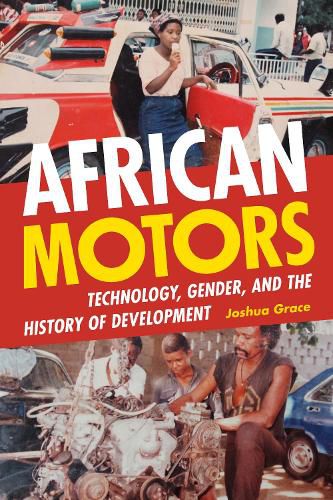Readings Newsletter
Become a Readings Member to make your shopping experience even easier.
Sign in or sign up for free!
You’re not far away from qualifying for FREE standard shipping within Australia
You’ve qualified for FREE standard shipping within Australia
The cart is loading…






In African Motors, Joshua Grace examines how Tanzanian drivers, mechanics, and passengers reconstituted the automobile into a uniquely African form between the late 1800s and the early 2000s. Drawing on hundreds of oral histories, extensive archival research, and his ethnographic fieldwork as an apprentice in Dar es Salaam’s network of garages, Grace counters the pervasive narratives that Africa is incompatible with technology and that the African use of cars is merely an appropriation of technology created elsewhere. Although automobiles were invented in Europe and introduced as part of colonial rule, Grace shows how Tanzanians transformed them, increasingly associating their own car use with maendeleo, the Kiswahili word for progress or development. Focusing on the formation of masculinities based in automotive cultures, Grace also outlines the process through which African men remade themselves and their communities by adapting technological objects and systems for local purposes. Ultimately, African Motors is an African-centered story of development featuring everyday examples of Africans forging both individual and collective cultures of social and technological wellbeing through movement, making, and repair.
$9.00 standard shipping within Australia
FREE standard shipping within Australia for orders over $100.00
Express & International shipping calculated at checkout
In African Motors, Joshua Grace examines how Tanzanian drivers, mechanics, and passengers reconstituted the automobile into a uniquely African form between the late 1800s and the early 2000s. Drawing on hundreds of oral histories, extensive archival research, and his ethnographic fieldwork as an apprentice in Dar es Salaam’s network of garages, Grace counters the pervasive narratives that Africa is incompatible with technology and that the African use of cars is merely an appropriation of technology created elsewhere. Although automobiles were invented in Europe and introduced as part of colonial rule, Grace shows how Tanzanians transformed them, increasingly associating their own car use with maendeleo, the Kiswahili word for progress or development. Focusing on the formation of masculinities based in automotive cultures, Grace also outlines the process through which African men remade themselves and their communities by adapting technological objects and systems for local purposes. Ultimately, African Motors is an African-centered story of development featuring everyday examples of Africans forging both individual and collective cultures of social and technological wellbeing through movement, making, and repair.